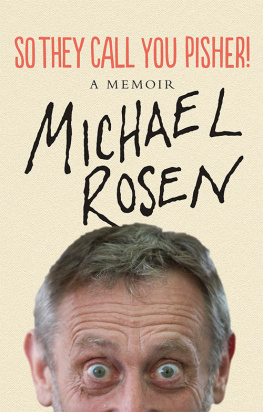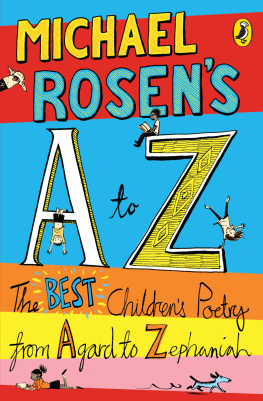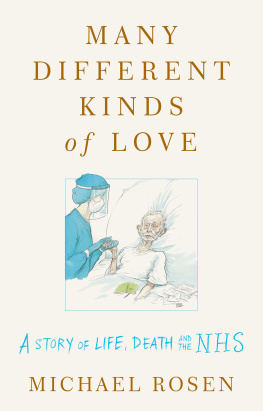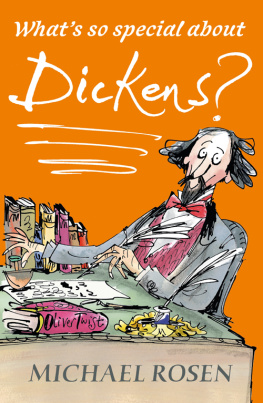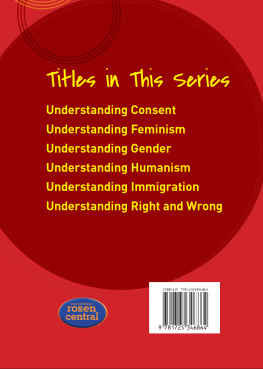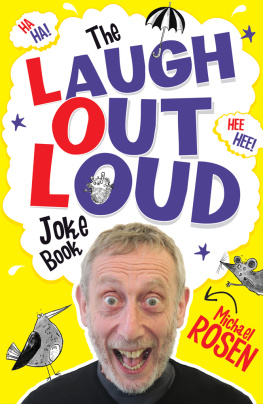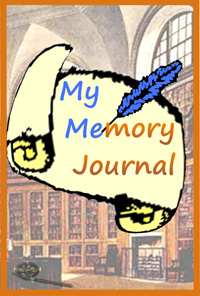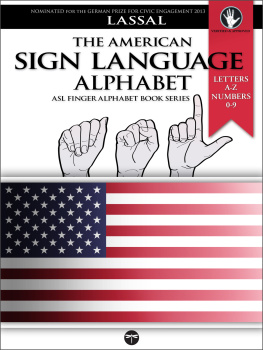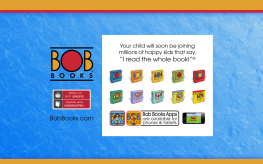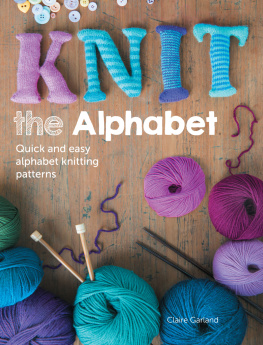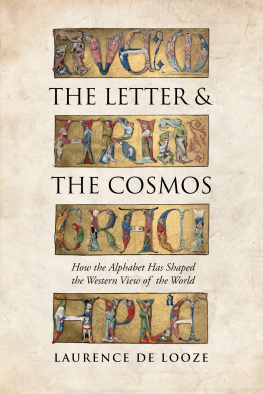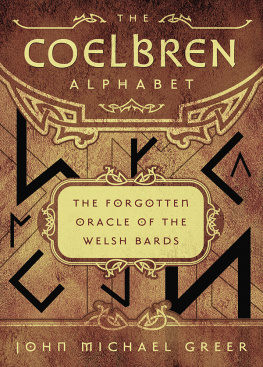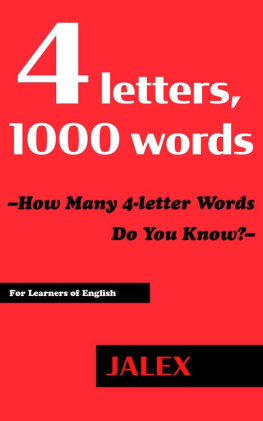Also by Michael Rosen
Selected Poems
Fighters for Life: Selected Poems
William Shakespeare, In His Time For Our Time
Michael Rosens Sad Book, illustrated by Quentin Blake
The Penguin Book of Childhood
ALPHABETICAL
How Every Letter Tells a Story
Michael Rosen

www.johnmurray.co.uk
First published in Great Britain in 2013 by John Murray (Publishers) An Hachette UK company Copyright Michael Rosen 2013
The right of Michael Rosen to be identified as the Author of the Work has been asserted by him in accordance with the Copyright, Designs and Patents Act 1988.
All rights reserved.
No part of this publication may be reproduced, stored in a retrieval system, or transmitted, in any form or by any means without the prior written permission of the publisher.
A CIP catalogue record for this title is available from the British Library ISBN 978-1-84854-887-9
John Murray (Publishers)
338 Euston Road
London NW1 3BH
www.johnmurray.co.uk
For the three Es, Emma, Elsie and Emile
CONTENTS
INTRODUCTION
IN FRONT OF me is a line of children and parents who want me to sign their books. As each child comes up to the table I ask their name. For most of the names, I check how its spelled. Sometimes this is because its one I havent heard of, sometimes its because there are several ways to spell the name, sometimes its because its quite possible that the parents have invented a new spelling. So I ask. The child or the parent spells it out for me: S-h-e-r-r-i-l-e-e-n. Thank you, I say. Did you come up with that spelling?
Yes, says the mother.
Great, I say, enjoying the fact that people feel free to take the alphabet into their own hands and use it for their own purposes, making up names, making up spellings, getting the letters that are given to us to do a job that they want done.
The next child arrives. I write his name: Tariq, and have a quiet smile to myself how the rule that the letter q must, must, must be accompanied by a u and if its at the end of a word with a u and an e is quietly but insistently laid to one side by people with Muslim names. Although we talk of rules in language, they are in fact more like treaties between consenting groups. We abide by these until such time as someone or some group thinks that they would like to change things and so a new clause is written into the treaty: people with Muslim names dont have to do that u or u plus e thing.
I write my name in their book: Michael Rosen, and I look at it, trying to be the child or the parent looking at that name for the first time. Will they notice that the m is always asymmetrical; the dot on the i is more like an acute accent, pointing up to the top right-hand corner of the page; the r is flashily curly; the s is decidedly uncurly?
Like many people Im curious about my name, but on occasions when the air in schools is full of talk about phonics, I look at Michael and wonder about the history that enabled the i to be long and not short like the i in pin. I wonder why the ch is there when a k would have done the job very well, and indeed some of the children standing in front of me come from places where it is Mikel. And then, what about that ae, which I and most English speakers pronounce with the all-pervasive sound which has its own special name the schwa: why is it ae? Were the two letters once stuck together as we used to see in encyclopdia and medival? Or was it once an ae which was separated by one of the few dots and slashes that English used to be fairly free with? The double dot that used to sit over the i in nave looking like the German umlaut but, because it does a different job, separating out vowels gets its own special name, the dieresis. And look, here comes a girl to whom, when she tells me her name, I say, Is that Zoe with dots, or no dots?
Then, on to the Rosen, which often gives people a moments bother. Is the s like s in chosen or the s in closer? I tell people its Rose with an n on the end, a German name. A little flash of German lessons in the late 1950s appears in my thoughts, followed by the memory that the users of English nearly got rid of those n plurals but not quite: child children, man men, woman women. How interesting that one last refuge for the n plural is to do with our sexes and the result of those sexual differences. As you follow the development of English, starting out with those cross-Channel migrants, the Frisians from what is now northern Holland, you can see how another wave, the Norman French, put the n to flight. In most circumstances, people change the language they use by choice, not from being compelled to. Over hundreds of years, people swapped Germanic Ns for Romance Ss. I remember being read a Walter de la Mare poem when I was at school that had the word shoon in it. It means shoes, explained our teacher. Rosen, it means roses, I think.
In the early years of the nineteenth century, Jews sought equal rights in the German principalities. Part of the deal was that they would take on German names in their daily affairs. This had its price quite literally; Jews had to buy these new names when some couldnt afford to, and they were sometimes given derogatory, mocking or even obscene names: Ochsenschwanz oxtail with the tail being lewdly ambiguous; Hinkediger hunchback; Kaufpisch sell-piss. In my family name, though, there is a memory that some forebear had enough money to buy an old German name which was used to record that someone worked in the rose-water trade. Whats more, it has been suggested that the Rosen-type names were popular amongst those Jews whose Hebrew name recorded a matronymic, a name that says: I am the son of this woman. So, a man might be Ezra ben Rosa son of Rosa, and to remember that, some people opted for one of the Rosen-type names. The sound of Rosa, transferred across from Hebrew letters, conserved in the Roman letters r, o, s and e, was perhaps a piece of cultural self-awareness, resistance even. I take it that people anywhere, any time, can make letters do this kind of work for them. If the situation demands it, they can switch languages, create hybrids, invent new spellings new identities even. Naming ourselves and others is part of how we show that we are at one and the same time me and part of an us. Slight changes in spellings, initials or even the particular script might signify a great deal.
Letters, then, are ours; we inherit them in what look like fixed ways but there is some leeway for us to change their use. Its this process of being within the history of language but also in possession of the possibility of its change that has always fascinated me. Its why Ive written this book.
Before I get going, I should clear the decks. The book is apparently about the alphabet, but in truth its about an alphabet, the one that speakers of English use. Its sometimes called the Roman alphabet which is misleading because, no matter how beautifully we may think they carved their inscriptions in stone, the Romans didnt have all twenty-six letters or the lower case. If we say its the alphabet used by European languages, that too is slightly misleading because languages other than English that use the same letters have added special features of their own, like the German double s symbol, , or the many varied diacritics or accents. To my mind, the accents, the umlaut, the tilde, the circumflex, the cedilla and the rest are part of peoples alphabets. The alphabet of this book, which Ill be calling the alphabet, hasnt developed these useful signs. To be absolutely clear: just because Im calling it the alphabet, Im not intending to lend it any particular glitter or glory; Im not positioning it in any way higher in status than any other alphabet or system of writing. Its the alphabet, as in the alphabet I use when I write in English.


